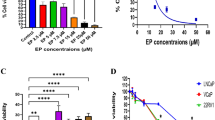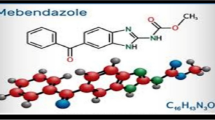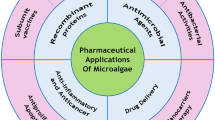Abstract
Earthworms are tube-shaped, segmental worms and have a double transport system consisting of earthworm coelomic fluid (ECF) moving within the fluid-filled colon. As one of the naturally available extracts (NAEs), ECF exerts different biological functions, such as inhibiting the proliferation of cancer cells. Pharmacokinetic limitations in prostate cancer (PCa) treatment and undesirable side effects of chemotherapeutic drugs necessitate the discovery of new anticancer agents. Recent studies have focused on the antitumor activity of different regions of earthworms as a new potential anticancer agent. However, there are limited findings on the potential effects of ECF on PCa cells in vitro. Therefore, we aimed to evaluate the potential anticancer effects of ECF (obtained from Eisenia foetida) on two different types of PCa cells. In this study, the protein content of ECF, the most effective dose and incubation time and potentially genotoxic and apoptotic effects were determined in PC-3 and LNCaP cells for the first time. Bax and Bcl-2 gene and protein expression levels were determined by real-time polymerase chain reaction (RT-PCR) and western blotting, respectively. ECF increased apoptotic cell death; however, it did not have a significant genotoxic effect on PCa cells. The apoptotic effect of ECF in PCa cells varies according to the AR status and is more effective in AR-insensitive cells (PC-3). Therefore, our results will specifically support the pharmacological development of ECF as a potential anticancer molecule in the treatment of PCa in the future.





Similar content being viewed by others
References
Abraham M, Augustine D, Rao RS et al (2017) Naturally available extracts inhibiting cancer progression: A systematic review. J Evid Based Complementary Altern Med 22:870–878. https://doi.org/10.1177/2156587217744914
Akpinar G, Yoneten KK, Kasap M, Karaoz E (2021) Search for novel plasma membrane proteins as potential biomarkers in human mesenchymal stem cells derived from dental pulp, adipose tissue, bone marrow, and hair follicle. J Membr Biol 254:409–422. https://doi.org/10.1007/s00232-021-00190-1
Augustine D, Rao RS, Anbu J, Chidambara Murthy KN (2017) In vitro antiproliferative effect of earthworm coelomic fluid of Eudrilus eugeniae, Eisenia foetida, and Perionyx excavatus on squamous cell carcinoma-9 cell line: a pilot study. Pharmacognosy Res 9:S61–S66. https://doi.org/10.4103/pr.pr_52_17
Augustine D, Rao RS, Anbu J, Chidambara Murthy KN (2018) Anticancer prospects of earthworm extracts: a systematic review of in vitro and in vivo studies. Pharm Rev 12:46–55. https://doi.org/10.4103/phrev.phrev_45_17
Augustine D, Rao RS, Anbu J, Chidambara Murthy KN (2019) In vitro cytotoxic and apoptotic induction effect of earthworm coelomic fluid of Eudrilus eugeniae, Eisenia foetida, and Perionyx excavatus on human oral squamous cell carcinoma-9 cell line. Toxicol Rep 6:347–357. https://doi.org/10.1016/j.toxrep.2019.04.005
Bradford MM (1976) A rapid and sensitive method for the quantitation of microgram quantities of protein utilizing the principle of protein-dye binding. Anal Biochem 72:248–254. https://doi.org/10.1006/abio.1976.9999
Calabrò F, Sternberg CN (2007) Current indications for chemotherapy in prostate cancer patients. Eur Urol 51:17–26. https://doi.org/10.1016/j.eururo.2006.08.013
Chan TH, Chen L, Guan XY (2012) Role of translationally controlled tumor protein in cancer progression. Biochem Res Int 2012:369384. https://doi.org/10.1155/2012/369384
Chen H, Takahashi S, Imamura M et al (2007) Earthworm fibrinolytic enzyme: antitumor activity on human hepatoma cells in vitro and in vivo. Chin Med J 120:898–904. https://doi.org/10.5555/cmj.0366-6999.120.10.p898
De Colibus L, Sonnen AF, Morris KJ et al (2012) Structures of lysenin reveal a shared evolutionary origin for pore-forming proteins and its mode of sphingomyelin recognition. Structure 20:1498–1507. https://doi.org/10.1016/j.str.2012.06.011
DeFeo K, Hayes C, Chernick M, Ryn JV, Gilmour SK (2010) Use of dabigatran etexilate to reduce breast cancer progression. Cancer Biol Ther 10:1001–1008. https://doi.org/10.4161/cbt.10.10.13236
Deng ZH, Yin JJ, Luo W et al (2018) The effect of earthworm extract on promoting skin wound healing. Biosci Rep 38:BSR20171366. https://doi.org/10.1042/BSR20171366
Gachet Y, Tournier S, Lee M, Lazaris-Karatzas A, Poulton T, Bommer UA (1999) The growth-related, translationally controlled protein P23 has properties of a tubulin binding protein and associates transiently with microtubules during the cell cycle. J Cell Sci 112:1257–1271. https://doi.org/10.1242/jcs.112.8.1257
Hu B, Yan Y, Tong F et al (2018) Lumbrokinase/paclitaxel nanoparticle complex: potential therapeutic applications in bladder cancer. Int J Nanomedicine 13:3625–3640. https://doi.org/10.2147/IJN.S166438
Hua Z, Wang YH, Cao HW, Pu LJ, Cui YD (2011) Purification of a protein from coelomic fluid of the earthworm Eisenia foetida and evaluation of its hemolytic, antibacterial, and antitumor activities. Pharm Biol 49:269–275. https://doi.org/10.3109/13880209.2010.508498
Hung JY, Yang CJ, Tsai YM, Huang HW, Huang MS (2008) Antiproliferative activity of aucubin is through cell cycle arrest and apoptosis in human non-small cell lung cancer A549 cells. Clin Exp Pharmacol Physiol 35:995–1001. https://doi.org/10.1111/j.1440-1681.2008.04935.x
Kakkar AK, Levine MN, Kadziola Z et al (2004) Low molecular weight heparin, therapy with dalteparin, and survival in advanced cancer: the fragmin advanced malignancy outcome study (FAMOUS). J Clin Oncol 22:1944–1948. https://doi.org/10.1200/JCO.2004.10.002
Kalantzi OI, Hewitt R, Ford KJ et al (2004) Low dose induction of micronuclei by lindane. Carcinogenesis 25:613–622. https://doi.org/10.1093/carcin/bgh048
Kauschke E, Mohrig W (1987) Cytotoxic activity in the coelomic fluid of the annelid Eisenia foetida Sav. J Comp Physiol B 157:77–83. https://doi.org/10.1007/BF00702731
Klerk CP, Smorenburg SM, Otten HM et al (2005) The effect of low molecular weight heparin on survival in patients with advanced malignancy. J Clin Oncol 23:2130–2135. https://doi.org/10.1200/JCO.2005.03.134
Kobayashi H, Suzuki H, Ohta N (2006) Exfoliation of the epidermal cells and defecation by amphibian larvae in response to coelomic fluid and lysenin from the earthworm Eisenia foetida. Biomed Res 27:169–181. https://doi.org/10.2220/biomedres.27.169
Lin Z, Zhen Z, Ren L et al (2018) Effects of two ecological earthworm species on atrazine degradation performance and bacterial community structure in red soil. Chemosphere 196:467–475. https://doi.org/10.1016/j.chemosphere.2017.12.177
Nader R, El Amm J, Aragon-Ching JB (2018) Role of chemotherapy in prostate cancer. Asian J Androl 20:221–229. https://doi.org/10.4103/aja.aja_40_17
Ozkan AD, Yuksel B (2022) POLY I:C-ınduced TLR3 activation on oxidative stress levels in PC-3 (hormone insensıtıve) and LNCAP (hormonesensıtıve) as prostate cancer cells. J Health Sci Kocaeli Uni 8:18–24. https://doi.org/10.30934/kusbed.915511
Reynolds JW, Reynolds WM (1972) Earthworms in medicine. Am J Nurs 72:1273. https://doi.org/10.1097/00000446-197207000-00039
Roch P, Lassegues M, Valembois P (1991) Antibacterial activity of Eisenia fetida andrei coelomic fluid: III–Relationship within the polymorphic hemolysins. Dev Comp Immunol 15:27–32. https://doi.org/10.1016/0145-305x(91)90044-y
Shafi FAA, Faleh N (2019) Anticancer activity of earthworm powder (Lumbricus terrestris) against MCF-7 and PC-3 cancer cell lines. J Gastrointest Cancer 50:919–925. https://doi.org/10.1007/s12029-019-00268-z
Singh J, Schädler M, Demetrio W, Brown GG, Eisenhauer N (2019) Climate change effects on earthworms - a review. Soil Org 91:114–138. https://doi.org/10.25674/so91iss3pp114
Vaillier J, Cadoret MA, Roch P, Valembois P (1985) Protein analysis of earthworm coelomic fluid. III. Isolation and characterization of several bacteriostatic molecules from Eisenia fetida andrei. Dev Comp Immunol 9:11–20. https://doi.org/10.1016/0145-305x(85)90055-2
Yanqin L, Yan S, Zhenjun S, Shijie L, Chong W, Yan L, Yuhong G (2007) Coelomic fluid of the earthworm Eisenia fetida induces apoptosis of HeLa cells in vitro. J Eur Soil Bio 43:143–148. https://doi.org/10.1016/j.ejsobi.2007.08.049
Yuksel B, Özkan AD (2021) The role of citrus nobiletin on oxidative stress levels and superoxide dismutase activities in metastatic castration-resistant prostate cancer. Commagene J Biol 5:84–89. https://doi.org/10.31594/commagene.895415
Yuksel B, Ozkan AD, Aydın D, Betts Z (2022) Evaluation of theantioxidative and genotoxic effects of sodium butyrate on breast cancer cells. Saudi J Biol Sci 29:1394–1401. https://doi.org/10.1016/j.sjbs.2021.12.061
Acknowledgements
We thank Prof Dr Murat Kasap and Assoc Prof Dr Gurler Akpinar from the Department of Medical Biology, Kocaeli University, for supporting our experiments.
Funding
This work was supported by [Scientific and Technological Research Council of Turkey (TUBITAK)] (Grant Number [120Z109]).
Author information
Authors and Affiliations
Contributions
All authors contributed to the study’s conception and design. Material preparation, data collection and analysis were performed by ADO, GGE, MS and NK. The first draft of the manuscript was written by ADO, OA, BY, ZB and all authors commented on previous versions of the manuscript. All authors read and approved the final manuscript.
Corresponding author
Ethics declarations
Conflict of interest
The authors have no competing interests to declare that are relevant to the content of this article.
Additional information
Publisher’s Note
Springer Nature remains neutral with regard to jurisdictional claims in published maps and institutional affiliations.
Rights and permissions
About this article
Cite this article
Ozkan, A.D., Eskiler, G.G., Sarihan, M. et al. Anticancer Properties of Eisenia Foetida Proteins in Prostate Cancer Cells In Vitro. Int J Pept Res Ther 28, 119 (2022). https://doi.org/10.1007/s10989-022-10428-8
Accepted:
Published:
DOI: https://doi.org/10.1007/s10989-022-10428-8




